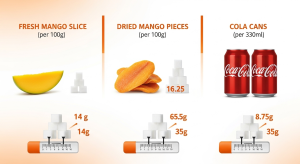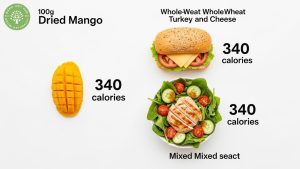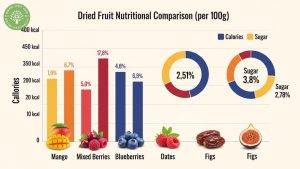If you’ve just finished a whole bag of dried mango and wondering about the consequences, you’re not alone – eating too much dried mango can lead to digestive discomfort, blood sugar spikes, and excessive calorie intake, though these effects are typically temporary and manageable.
At Ogani VN, we understand the irresistible sweetness of dried mango can make portion control challenging. While dried mango offers valuable nutrients like vitamin A and dietary fiber, overconsumption can trigger uncomfortable symptoms ranging from bloating to more serious blood sugar fluctuations.
Immediate digestive effects when eating too much dried mango

When you’re eating too much dried mango, your digestive system often responds within hours. The high fiber content that makes dried mango beneficial in moderation becomes problematic in large quantities.
Bloating and gas formation
The concentrated fiber in dried mango can overwhelm your digestive system. A typical 100-gram serving contains about 2-3 grams of fiber, but when you consume an entire 150g bag, you’re getting 4-5 grams at once. This sudden fiber influx causes fermentation in your intestines, producing excess gas.
Diarrhea and loose stools
Beyond gas, the sorbitol naturally present in mangoes acts as a mild laxative. Combined with high fiber content, this can trigger loose bowel movements or diarrhea within 2-6 hours of overconsumption. Your body essentially fast-tracks digestion to process the excess fruit sugars and fiber.
Stomach cramps and discomfort
The rapid fermentation process doesn’t just create gas – it can cause painful cramping. Your intestinal muscles contract more forcefully to move the excess fiber through your system, resulting in sharp or dull abdominal pain that typically lasts 3-8 hours.
Blood sugar problems from eating too much dried mango
Eating too much dried mango poses particular risks for blood sugar management. The dehydration process concentrates natural sugars, making dried mango significantly higher in sugar per gram than fresh mango.
Understanding sugar concentration in dried fruit

Fresh mango contains about 14 grams of sugar per 100 grams, but dried mango packs 60-70 grams of sugar in the same weight. This means a small handful can deliver the sugar equivalent of eating 3-4 whole fresh mangoes. For context, that 150g bag contains roughly 90-105 grams of sugar – equivalent to drinking 2-3 cans of soda.
Impact on insulin response
This sugar rush forces your pancreas to produce large amounts of insulin quickly. Regular overconsumption can lead to insulin resistance over time, increasing diabetes risk. If you already have diabetes or prediabetes, these spikes can be particularly dangerous, potentially requiring medical intervention.
Long-term metabolic effects
Repeated blood sugar spikes from eating too much dried mango can contribute to metabolic syndrome. Your cells become less responsive to insulin, leading to persistently elevated blood sugar levels. This creates a cycle where you crave more sweet foods, making portion control even harder.
Weight gain risks when eating too much dried mango

Many people don’t realize how calorie-dense dried mango becomes through dehydration. What seems like a light snack can quickly become a calorie bomb.
A single 100-gram serving of dried mango contains approximately 320-350 calories – comparable to a small meal. When you mindlessly finish a whole bag, you’ve consumed 450-500 calories without feeling particularly full. This happens because dried fruit lacks the water content that helps trigger satiety signals in fresh fruit.
Weight gain occurs when these extra calories become a regular pattern. If you’re eating too much dried mango several times per week, those additional 500-calorie sessions add up to 2000+ extra calories – enough to gain half a pound of body weight. The high sugar content also promotes fat storage, particularly around the midsection.
At Ogani VN, we’ve noticed customers often underestimate portion sizes with dried fruits. The chewy texture and concentrated sweetness make it easy to consume far more than intended, especially when eating directly from the package while distracted.
How to balance benefits while avoiding eating too much dried mango
Despite the risks of overconsumption, dried mango offers legitimate nutritional value when eaten mindfully.
Positive nutrients in dried mango
Dried mango provides significant amounts of vitamin A for eye health, vitamin C for immunity (though less than fresh), and antioxidants that fight cellular damage. The fiber content, when consumed moderately, supports healthy digestion and can help regulate cholesterol levels.
When benefits become drawbacks
However, these benefits diminish when you’re eating too much dried mango. Excess vitamin A can cause nausea and headaches, while too much fiber leads to the digestive issues mentioned earlier. The antioxidant benefits are also offset by the inflammatory effects of consuming excessive sugar.
Finding the sweet spot
The key lies in treating dried mango as a concentrated food rather than a casual snack. Think of it like dark chocolate – nutritious in small amounts but problematic when overconsumed. A balanced approach allows you to enjoy the benefits without triggering negative side effects.
Smart strategies to prevent eating too much dried mango
Learning proper portion control prevents the discomfort of eating too much dried mango while still enjoying this tropical treat.
Recommended daily intake

Nutritionists generally recommend limiting dried fruit intake to 30-40 grams per day – roughly a small handful or 4-5 pieces of dried mango. This provides nutritional benefits without overwhelming your system with sugar and calories.
Practical portioning tips
Pre-portion your dried mango into small containers or bags immediately after purchase. Never eat directly from large packages – it’s too easy to lose track. Use a food scale initially to understand what 30 grams actually looks like. At Ogani VN, we offer pre-portioned packs specifically to help customers avoid overconsumption.
Mindful eating techniques
Slow down your consumption by thoroughly chewing each piece. The concentrated sweetness means you need less to feel satisfied if you eat mindfully. Pair dried mango with protein or healthy fats like nuts to slow sugar absorption and increase satiety.
Frequently asked questions
Q: How long do symptoms last after eating too much dried mango? A: Digestive symptoms typically resolve within 6-12 hours. Bloating and gas may linger up to 24 hours, while blood sugar effects normalize within 2-4 hours for healthy individuals.
Q: Can eating too much dried mango cause an allergic reaction? A: While true mango allergies are rare, overconsumption can trigger pseudo-allergic responses like itching or mild swelling due to high histamine levels. Those with latex allergies may be more susceptible.
Q: Is unsweetened dried mango better for avoiding these issues? A: Unsweetened varieties are preferable as they avoid added sugars, but the natural sugar concentration remains high. Portion control is still essential even with unsweetened options.
Q: What should I do if I accidentally ate too much? A: Drink plenty of water to help flush your system, take a gentle walk to aid digestion, and avoid additional sugary foods for the next 24 hours. Consider peppermint tea for gas relief.
Q: How does dried mango compare to other dried fruits? A: Dried mango tends to be higher in sugar than dried berries but lower than dried dates or figs. It’s middle-range for calories but higher in vitamin A than most alternatives.

Your healthier approach to enjoying dried mango starts today
Eating too much dried mango can lead to uncomfortable digestive symptoms, blood sugar spikes, and unwanted weight gain, but these effects are manageable with proper awareness and portion control. At Ogani VN, we believe in enjoying dried mango as part of a balanced diet – savoring its tropical sweetness without overindulgence.
Ready to enjoy dried mango the healthy way? Visit our store to explore our pre-portioned dried fruit options, designed to give you all the nutritional benefits without the risks of overconsumption. Contact our nutrition team for personalized advice on incorporating dried fruits into your healthy lifestyle. Remember, moderation transforms dried mango from a potential problem into a delightful, nutritious treat.
Read more:
- Is Organic Dried Mango Good For You? Health Benefits Revealed
- Best Dried Mango No Sugar Added: Premium Quality Guide
- Calories In Dried Mango No Sugar Added: Complete Nutrition Guide
- What Happens When You’re Eating Too Much Dried Mango?


